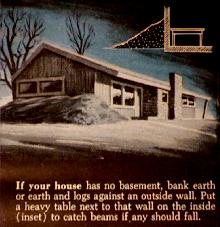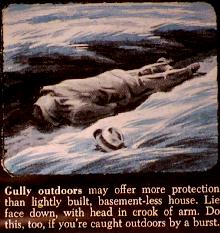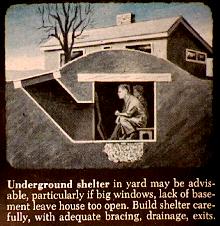
Some Answers for A-War Questions
- How bad is the A-bomb? The bomb is mainly a big wind and a big fire - bigger than most people can comprehend. It can knock down brick buildings a mile away, flash-burn timber two miles away. Besides the fires set directly, damage to power lines, gas mains, and furnaces starts hundreds of secondary fires. It is this ability to destroy such a large area that make the A-bomb a revolutionary weapon. A single bomb could knock out most of a big city's fire-fighting equipment, hospitals, utilities.
- What about the H-bomb? It's still only a theoretical possibility. If perfected, it would wreak the same kind of damage as the A-bomb, but over a larger area.

- What should I do about radiation protection? Stop worrying. If you're close enough to get direct radiation from the blast itself, you're likely to be killed by the blast, fire or flying debris anyway. Shelter will guard against radiation, even under the bomb. If the bomb explodes in the air, as seems likely, very little radiation will linger after the burst.
- Won't I be safer in a community shelter? Possibly. And perhaps more comfortable, too, since many will have shower rooms, kitchens, first-aid stations, and utilities. But you may not be able to get there during an attack. Besides, World War II experience indicates most people prefer to take their chances at home - London's ample community facilities were never fully used.

- What should I tell the children? The truth. They need to know for their own safety. Teach them where to go in a raid, how to "hit the deck", and what to do if they become separated from you. Don't scare them, but don't make it a game either.

It will help to know what NOT to do.
- Don't blackout your house. With radar bombing and, possibly, guided missiles, lights won't make much difference. Along the coast, however, sub danger may require dimout.
- Don't tape windows. It's practicly usless against an A-bomb blast.
- Don't buy a Geiger counter. Unless you're an expert, it will probably only confuse you.
- Don't buy radiation "remedy." The only help for radiation injury is rest and blood transfusions.
- Don't hoard food. If your area is so badly hit that food supply is disrupted more than a few days, you'll have to leave it behind when you get out.
If anything happens, you'll be glad you were ready. If nothing happens, you're still ahead of the game. You have just two very hard things to do: one, to get ready; two, to keep going.
In doing these things, you and your family will be assuming an attitude and forming a habit more helpful to defense than Geiger counters. By building your family foxhole, you will also be building the state of mind that can resist the pressures of aggression as well as the shocks of actual atomic war.